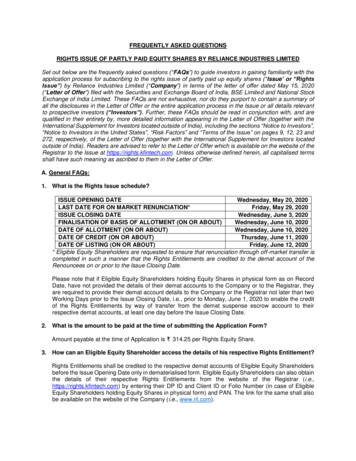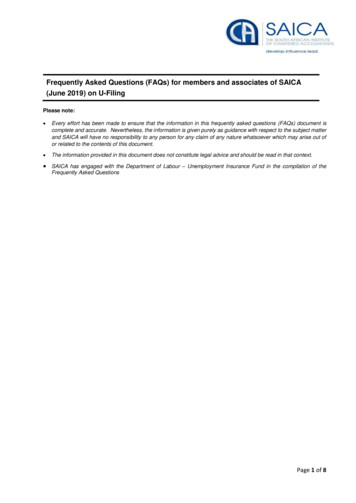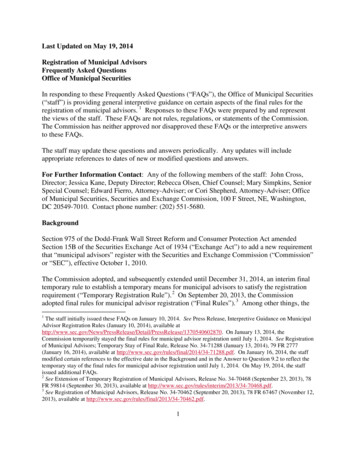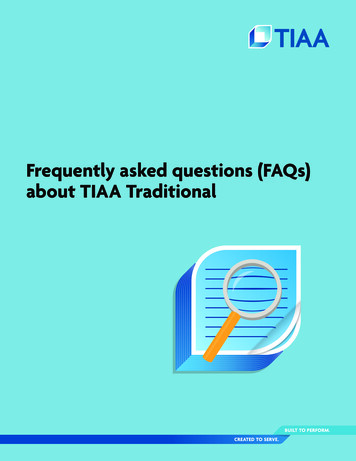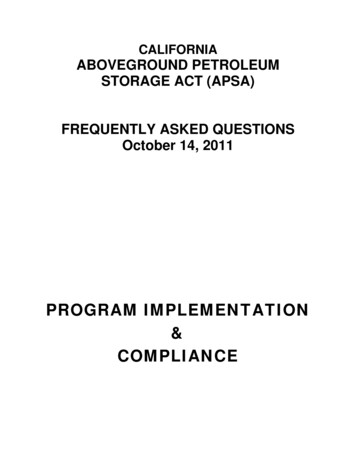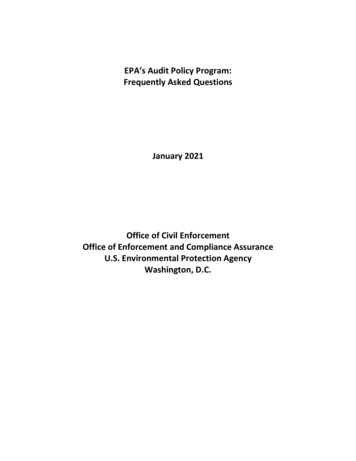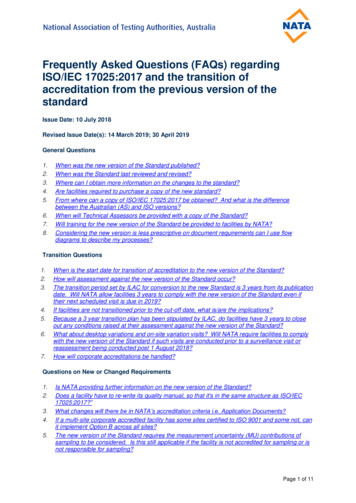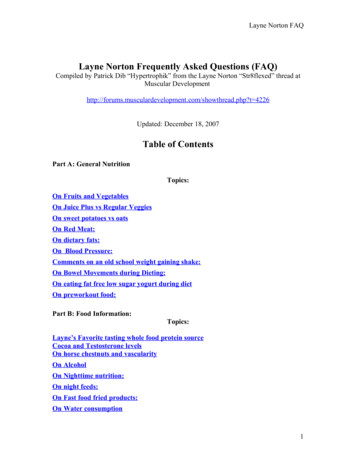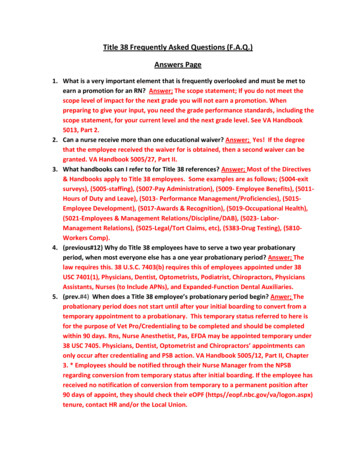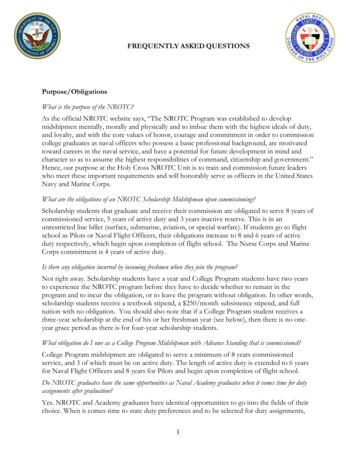
Transcription
FREQUENTLY ASKED QUESTIONSPurpose/ObligationsWhat is the purpose of the NROTC?As the official NROTC website says, “The NROTC Program was established to developmidshipmen mentally, morally and physically and to imbue them with the highest ideals of duty,and loyalty, and with the core values of honor, courage and commitment in order to commissioncollege graduates as naval officers who possess a basic professional background, are motivatedtoward careers in the naval service, and have a potential for future development in mind andcharacter so as to assume the highest responsibilities of command, citizenship and government.”Hence, our purpose at the Holy Cross NROTC Unit is to train and commission future leaderswho meet these important requirements and will honorably serve as officers in the United StatesNavy and Marine Corps.What are the obligations of an NROTC Scholarship Midshipman upon commissioning?Scholarship students that graduate and receive their commission are obligated to serve 8 years ofcommissioned service, 5 years of active duty and 3 years inactive reserve. This is in anunrestricted line billet (surface, submarine, aviation, or special warfare). If students go to flightschool as Pilots or Naval Flight Officers, their obligations increase to 8 and 6 years of activeduty respectively, which begin upon completion of flight school. The Nurse Corps and MarineCorps commitment is 4 years of active duty.Is there any obligation incurred by incoming freshmen when they join the program?Not right away. Scholarship students have a year and College Program students have two yearsto experience the NROTC program before they have to decide whether to remain in theprogram and to incur the obligation, or to leave the program without obligation. In other words,scholarship students receive a textbook stipend, a 250/month subsistence stipend, and fulltuition with no obligation. You should also note that if a College Program student receives athree-year scholarship at the end of his or her freshman year (see below), then there is no oneyear grace period as there is for four-year scholarship students.What obligation do I owe as a College Program Midshipman with Advance Standing that is commissioned?College Program midshipmen are obligated to serve a minimum of 8 years commissionedservice, and 3 of which must be on active duty. The length of active duty is extended to 6 yearsfor Naval Flight Officers and 8 years for Pilots and begin upon completion of flight school.Do NROTC graduates have the same opportunities as Naval Academy graduates when it comes time for dutyassignments after graduation?Yes. NROTC and Academy graduates have identical opportunities to go into the fields of theirchoice. When it comes time to state duty preferences and to be selected for duty assignments,1
the students with the higher academic and aptitude rankings, regardless of where they go toschool, will be most likely to receive their first choice of assignments.Would I get the choice of the duty I want after graduation?Most likely. Just before the beginning of the senior year our students are asked to state theirduty preferences, and most will get their first choice of duty. There are prerequisites for certainduty preference, such as being physically qualified for aviation or passing a screening interviewto pursue a career aboard nuclear powered ships and submarines.Can I be guaranteed flight school after graduation?The Navy does not give such a guarantee. However, experience has shown that a solid academicperformance, high scores on the aviation aptitude exam, and being physically qualified foraviation will give a midshipman an excellent chance of getting his aviation choice.What about graduate school? Is there any way to go directly to graduate school, and to serve the obligated militaryservice after graduate school?That is a possibility, but not a very likely one unless you have an exceptional record ofundergraduate academic work. Across the nation, a few top students are selected each year to goon to graduate school, but the vast majority will be expected to enter the military aftergraduation. Keep in mind, though, that the Navy and Marine Corps have their ownPostgraduate School in Monterey, California, and you would be eligible for assignment thereafter your initial sea tours to obtain a graduate degree in the field of your choice while receivingfull pay.Can I go from the NROTC program directly into medical school and serve my obligated time as a Navy doctor?Maybe. At this time, only about twenty-five NROTC midshipmen nationwide are givenpermission to apply to medical school each year. If admitted to a medical school, they wouldattend immediately following graduation. Under this program, students would begin to servetheir obligation following their residency. To enter this program, the student must first bepermitted to apply to medical school as an NROTC student, and then must gain acceptance intoa medical school.What would happen if I decided not to continue in the NROTC program after I have started the sophomore yearand incurred an obligation for active duty?There are several reasons and circumstances for leaving the NROTC program. To reiterate,there is no obligation at all if you leave before your sophomore year. However, if you decide toleave after the start of the sophomore year, then you would be held liable for either monetaryrepayment of the scholarship or for active military service in enlisted status immediately if youdrop out of college, or upon graduation if you stay in college. If a medical issue precludes youfrom being commissioned, then the obligation would most likely be dismissed. If you aredropped from the program because of your own misconduct or inaptitude, you could berequired to reimburse the Navy for your tuition and book expenditures at the discretion of theSecretary of the Navy.2
BenefitsWhat are the NROTC scholarship benefits?The scholarship covers full tuition at Holy Cross University for two, three or four yearsdepending on when the student applies for a scholarship. In addition, educational fees,uniforms, and a 250 per month tax-free subsistence allowance are paid by the Navy formidshipmen on scholarship while in attendance at the university as a freshman ( 50/montheach additional year; i.e., 300, 350, and 400). The students are also given a 750 textbookstipend every year, which is deposited in equal payments at the beginning of each academicterm. The NROTC program also pays for scholarship students’ transportation from home tosummer cruise training. Altogether, the textbook stipend, travel payments, and summer cruisepay over a four year period of full scholarship to Holy Cross amount to well over 165,000.Are there any benefits for the non-scholarship (College Program) students?Yes. Students who enter the junior year in College Program Advanced Standing status will beginreceiving the 350 per month tax-free subsistence allowance ( 400/month senior year). Also,during the entire four years, they are given the uniforms and naval science texts they need.College Program students in Advanced Standing status will also be permitted to attend summercruise between their junior and senior years with the NROTC program covering transportationcosts.Does the NROTC Scholarship pay for room and board?No, the NROTC Scholarship does not pay for room and board. However, Holy Cross doesoffer financial aid and other grants for certain qualified students. Prospective students areencouraged to contact the financial aid office to learn more information on room and board atHoly Cross.Application ProcessHow do I go about applying for an NROTC scholarship?A1. The application is done through the Naval ROTC website, https://www.nrotc.navy.mil.You can begin the application process at the end of your junior year of high school. You musthave your ACT or SAT scores sent to the scholarship board, and they must arrive beforeDecember 31st. All aspects of the application process, including the interview and medicalexam, are scheduled by the Navy recruiter in your area.A2. If you arrive on campus as a college freshman and desire to enroll in the NROTC program,you may apply for the College Program. By entering NROTC as a College Program student,you can apply for a three-year scholarship at the end of your freshman year. The staff at theNROTC Unit will assist you in preparing the application. If you are awarded and accept ascholarship, you incur the same obligation as a four-year scholarship student entering theirsophomore year.What are the basic qualifications needed to join the NROTC program?3
You must be a U.S. citizen; you must be at least 17 years old as of September 1st of the year youenter the program; and you must be able to graduate by age 25. Age waivers are available forthose with previous military service. You must be a high school graduate and you must bemedically qualified. Men must be between 62 and 78 inches tall (66 to 78 for Marines); womenbetween 60 and 78 inches tall (same for Marines). Weight should be proportionate to height (alink to a height/weight chart is included below). Vision must be correctable to 20/20 withrefractive error not exceeding 6.0 diopters ( 7.0 diopters for nurses). Normal color vision isrequired for Navy students. There is no color vision requirement for Marine Option students.There can be no severe hay fever or chronic rhinitis, and no history of asthma since the 12thbirthday. Positive HIV is disqualifying.What are my chances of receiving a scholarship?If you have a “B” average or above, moderate-to-excellent SAT or ACT scores, have beenactively involved in high school extracurricular activities (especially athletics), and wish to pursuea technical major, your chances of receiving a four-year scholarship are excellent. However, asdiscussed in other answers, even if you don’t receive a four-year scholarship in high school,joining the College Program at the beginning of your freshman year is an excellent way to proveyour aptitude and initiative, and compete for a three-year scholarship at the end of yourfreshman year.How are the scholarships awarded?The scholarship selection board meets from August through April of each year in Pensacola,Florida. This board is made up of different groups of NROTC Unit Commanding Officers(Navy Captains and Marine Corps Colonels). Because of the rolling nature of the board, youcould be awarded a scholarship at any time from November through April. If you are ever indoubt as to the status of your scholarship application package, visit the NROTC website:https://www.nrotc.navy.mil. Three-year scholarship awardees will be notified over the summerbetween freshman and sophomore year.As an NROTC scholarship student, can I attend the university of my choice?Yes, provided that the University has an NROTC Unit or that it has an agreement with a Unit ata nearby university for you to attend in a “cross-enrolled” status. A list of schools with NROTCunits is available at www.nrotc.navy.mil (again, Holy Cross University is not currently onthis list; however there is a NROTC program at Holy Cross that will enroll students infall 2012). In the NROTC scholarship application process, you will be asked to state youruniversity preference by listing five NROTC programs/schools. If you are denied admission toyour first-choice school, or if your choices change due to personal preference, you must notifythe Naval Service Training Command of your new desires. Transfer of your scholarship toanother school is permitted if the gaining NROTC Unit has not reached capacity. Occasionally,an NROTC Unit's freshmen class may fill to capacity. When this happens, scholarshipnominees who had wanted to attend that school, may be asked to attend their second or thirdchoice school. Scholarship awards are independent from admission to the host university. Inorder to execute an NROTC scholarship you must gain admission to the host university.Can I join the Unit and attend school elsewhere?4
Yes. You can join our Unit as a “cross-enrolled” student if you would like to attend WorcesterPolytechnic Institute or Worcester State University, our “cross-town affiliates.” We have anagreement that will allow you to use an NROTC scholarship to attend WPI or WSU when yougain admission. As a “cross-enrolled” student, you would attend WPI or WSU as a full timestudent, and come to the Holy Cross campus to attend Naval Science classes. If you are a NurseCorps scholarship candidate, be advised that Holy Cross has no nursing program. You will beapplying to and attending WSC as a cross-town student. WPI and WSU are both about a twentyminute commute from Holy Cross.If I want to change my first-choice school, whom do I tell?You should wait until after you are notified of selection as a scholarship nominee, and thenemail Naval Service Training Command (Code OD2); email links are provided under the contactlink at www.nrotc.navy.mil. This cannot be done over the telephone.I'm trying to decide which school to attend. Are there any differences among the various NROTC Units?The naval science curriculum at each school is identical. If there are any apparent differencesamong NROTC Units, they are due to the customs and traditions of the Units, and thepersonalities of the Unit Staffs, and even the midshipmen in those Units. Our advice would beto choose your university on the basis of its overall reputation and the availability of the degreeprograms you prefer. Look also, at the reputation of the school's graduates. You should narrowyour choices down to a few, and then visit those campuses (and their NROTC Units) to helpyou make the final decision.If I am given an NROTC scholarship, does that guarantee that I will be admitted to Holy Cross?No. The scholarship selection process is COMPLETELY INDEPENDENT of the HolyCross admission process. You must, on your own, seek admission to Holy Cross or some otherNROTC university. It is a good idea for NROTC scholarship applicants to apply to more thanone NROTC school to ensure acceptance to at least one NROTC school.Are NROTC scholarship selectees given any preferential treatment in the Holy Cross admission process?No. The same personal characteristics and academic credentials are considered in scholarshipselection and in Holy Cross admission; so, being selected for a scholarship is a good indicationthat you might also be selected for admission, but it is neither guaranteed nor implied.Should I wait for the results of the NROTC scholarship selection before I apply for admission to Holy Cross?Absolutely not! In most cases you won't be able to wait. The deadline for admission applicationto Holy Cross is 31 December. Unless you are fortunate enough to be selected for an earlyscholarship, you may not know your NROTC scholarship status until after Holy Cross’sadmission deadline.What happens if I am a College Program midshipman and don’t get a scholarship?If you don’t earn a scholarship by the end of your sophomore year, you will automatically besubmitted for Advance Standing status; if granted, it will provide you with a stipend everymonth during the school year for the remaining two years. Upon graduation Advanced Standing5
midshipmen receive the same commission as Scholarship midshipmen. If a midshipman has notbeen granted Advance Standing by the beginning of the junior year, he or she will be disenrolledfrom the NROTC program with no service obligation.What if I haven’t been granted a scholarship or I missed the 31 January deadline for the NROTC scholarshipapplication? Can I still join NROTC and receive a scholarship?Absolutely. As mentioned above, if a student hasn’t been granted a scholarship, he or she canjoin the NROTC College Program, and will be required to do everything a scholarship studentdoes. College Program students do not go on summer training. After one academic term, inwhich the student's academic performance and aptitude can be assessed, the student can berecommended for scholarship status to the Commander Naval Service Training Command, whois empowered to award scholarships to promising College Program students. In general, if youcan earn better than a 3.3 GPA in your first academic term, achieve a “B” or better in Calculus,and demonstrate a high aptitude for Naval Service, you would have a good chance for a 3-yearNROTC scholarship.As a scholarship applicant, how do I know whether I am being selected as a Navy or Marine Option candidate?When you send in the initial scholarship application form, you will have checked either the Navyor Marine Corps box on the form. The box you check will determine the route that yourapplication will then take. You will be contacted by a Navy or Marine Corps recruiter tocomplete your application processing, according to the box you checked. If you are processedby a Navy recruiter, then you will be eligible for a Navy Option scholarship. The Navy andMarine Corps conduct their own scholarship selection boards to consider their own candidates.The Marine Corps is a much smaller service than the Navy and requires fewer new officers eachyear. Thus, the number of NROTC scholarships awarded by the Marine Corps is far fewer thanis offered by the Navy.If I start out as a Marine Option student, can I switch to be a Navy option student, or vice versa?You can change from one option to the other, but it is not automatic. You must request thechange, and it must be approved by both Navy and Marine Corps officials on the basis of yourown personal record. The changing of option after the sophomore year is discouraged becauseit involves making up the specialized courses that are begun for Navy and Marine optionstudents beginning in the junior year.Is there any particular advantage in applying for the NROTC scholarship before the 31 January deadline?Absolutely. The earlier you apply, the earlier you can be selected for a scholarship. If you finishyour application processing in time to be considered by the early boards, you can be pickedmonths earlier than those who wait until the last minute to apply. The Navy conducts acontinuous selection process from August through April. Navy Option students are consideredfor scholarship selection as soon as their completed application packages are received by theboard. Knowing your scholarship selection status in the fall can be a big advantage in helpingyou to make decisions about which schools you can afford and to which you should apply. Byall means, apply for the scholarship as early as you can. You have everything to gain andnothing to lose. ALSO, APPLY TO ALL THE SCHOOLS YOU ARE INTERESTED IN,6
REGARDLESS OF COST, SINCE IT IS LIKELY THAT THE UNIVERSITYAPPLICATION DEADLINE WILL PASS BEFORE YOU KNOW YOUR SCHOLARSHIPRESULTS.Can you offer any hints regarding what the scholarship selection board looks for in making its selections?The NROTC scholarship selection board will consider the “whole person,” including CollegeBoard scores, grades, class standing, athletics, participation in extracurricular activities,recommendations, employment history, interview results, and perceived potential. We arelooking for the future leaders of the Navy and Marine Corps. We want well-rounded studentswho are intelligent enough to excel in academics, athletic enough to meet the physical challengesof military service, and who are personable and dynamic enough to assume roles as militaryleaders. It is not enough to be only bright, or only athletic, or only personable. It takes acombination of the three qualities to be a successful Naval Officer. Officer candidates must alsobe of high moral character. Students with criminal records or who use illegal drugs are not likelyofficer candidates.Care should be taken in selecting those who will provide written recommendations foryou. If a candidate is depicted as being just an average run-of-the-mill student, it will detractfrom the board's assessment of the individual. The application interview with your localrecruiter is also vitally important. Look sharp and present yourself well. College Board scorescan be a positive factor for the student, but only insofar as they are supported by actualacademic achievement. A student with high SAT or ACT scores, but mediocre grades and classstanding, is less desirable than a student with moderate scores and high grades and standing.One is coasting and the other is a hard working achiever.MedicalWill my scholarship selection be held up if I have trouble passing the medical exam?The scholarship selection process is completely independent of the medical examination.Scholarship selection is based on academic performance, extracurricular activities, anddemonstrated leadership potential. You can be selected as a scholarship nominee even beforeyou take the medical exam; but, of course, it cannot be awarded to you until you have passed themedical exam. The importance of completing and passing the medical exam cannot be overemphasized. It is up to you to do all that you can to complete the medical exam in a timelyfashion. I f follow-on exams or inputs from your local doctor are required, then you must ensurethat these requirements are met.If I am notified that some physical problem will disqualify me from scholarship eligibility, is there anything I cando?That depends on the nature of the problem. There are some problems, such as minor eyecorrections that can be waived. Some problems, such as having had certain childhood diseases,or a family history of diabetes, can cloud your medical record to the point that additional7
medical evidence may be required to substantiate your qualification. Unless you are told thatyour condition is absolutely disqualifying, you should do all that you can to obtain medicalcertification. Letters from family doctors or your local specialists can help to show that yourcondition should not be disqualifying. When in doubt, ask for a medical waiver. For moreinformation, see the link below to the Department of Defense Medical Examination ReviewBoard (DoDMERB) website.In addition to the medical exam, is there a physical fitness exam required for scholarship selection?Marine Option students are required to pass a physical fitness exam to be eligible for scholarshipselection. Navy Option students do not take this exam as a prerequisite to selection. Once inthe NROTC program, all midshipmen are required to pass a semi-annual physical fitnessassessment, which, for Navy option students, consists of push-ups, sit-ups, and a 1.5-mile run.Points are awarded for each exercise, and a minimum passing grade is established for eachexercise and for the total points earned. All midshipmen are encouraged to seek excellence intheir physical fitness, and to do more than the bare minimum to pass. Marine Option studentstake a slightly different test that consists of pull-ups, sit-ups, and a 3-mile run.Freshman OrientationIs there an orientation for new NROTC students where we can learn how to be midshipmen?Holy Cross provides orientation for incoming midshipmen during the school’s orientation forits freshman class. Please see the “Incoming Students” section of the website for moreinformation.Midshipmen LifeWhat do midshipmen have to do in the NROTC program?Midshipmen are required to take one Naval Science class each semester for four years. Theseclasses provide instruction subjects from the history of the Navy to shipboard operations andengineering. Students are also required to attend a Naval Science Lab twice a week. If studentsare on scholarship they are required to attend approximately 1 month of summer training forthree consecutive summers.How much of my time at school will be tied up in NROTC activities?As much as you want beyond a minimum of about ten hours per week. Your Naval Sciencecourses meet twice a week. In addition, there is a two-hour lab session twice a week, and youmay be asked to devote about two additional nights per month in required activities such as theannual Navy and Marine Corps Birthday Ball, the semiannual close order drill competitions, andthe annual Holy Cross (consortium partner) Military Excellence Competition (MEC) andBasketball Tournament. T here are also a few extracurricular activities available to you if you areinterested in them, such as the Reach the Beach, a 200-mile road relay in New Hampshire, forwhich the unit has provided multiple teams for over ten years.Do NROTC midshipmen wear uniforms to class every day like they do at the Naval Academy?8
No. NROTC midshipmen are only required to wear the uniform for one full day per weekthroughout the school year. Lab, otherwise known as drill, may consist of military formation,classroom sessions, general briefings, inspections or physical fitness training.Are NROTC midshipmen housed together on campus?No. Each student makes his or her own arrangements with the college for housing.What are the specific courses that I must take if I join the NROTC program that I wouldn't otherwise have totake?NROTC students take, on average, two Naval Science courses per year, one each in the fall andspring semesters. All scholarship students (both Navy and Marine Option) must take onesemester of American Military History/National Security Policy and one semester of CulturalAwareness. All Navy Option students are also required to take one year of English (grammarand composition), one year of Calculus (by the end of sophomore year) and one year of Physics(by the end of junior year). The NROTC Unit provides professional tutoring in calculus andphysics for those students who need help with these difficult subjects. Additionally, the Unitwill accept some AP credit for all academic requirements if these credits appear on the HolyCross transcript.What NROTC classes should I register in?Freshmen should register for “Naval Orientation”.What academic standards are there for NROTC Scholarship and College Program midshipmen?Scholarship and College Program midshipmen must maintain a 2.5 Grade Point Average on a4.0 scale, have no failing grades in any subject required for their major or commissioning,progress on a prescribed timeline for graduation, and have a full academic load every semester (5courses at Holy Cross).Who teaches the Naval Science courses?The NROTC staff is composed of active duty Navy and Marine Corps officers and enlistedpersonnel. The Naval Science courses are instructed by the staff officers. These same officerswill double as your NROTC class advisors, providing guidance and assistance as necessary, inyour academic and military pursuits.How does the Marine training differ from Navy training?In most respects, it is the same. Marine Option students are not required to take calculus andphysics courses, but are required to attend one extra physical training (PT) session every weekon Wednesday mornings. They also take different Naval Science courses in their junior andsenior years, and during the summer after their junior year they take part in the OfficerCandidate School (OCS) training program at Quantico, Virginia. They are guided in theirdevelopment by our Marine Officer Instructor (MOI), and upon graduation they arecommissioned as Second Lieutenants in the U.S. Marine Corps.Would I be allowed to change my major once I am in the NROTC program?9
Due to the tier system that the Navy recently implemented, all major fall into one of three tiers:- Tier 1 encompasses all technical engineering majors, such as mechanical and electricalengineering.- Tier 2 contains the physical and life sciences, as well as mathematics.- Tier 3 contains all other majors, including languages, the humanities, and socialsciences.If you wish to change your major within or up a tier (e.g., from Tier 3 to Tier 2), you may do sowith approval from the Commanding Officer of the Unit. If you wish change to move down atier (e.g., Tier 1 to Tier 2, etc.) you must first obtain the approval of Naval Service TrainingCommand (NSTC).Do I have to major in some particular subject if I join the NROTC?It depends. In an increasingly technical Navy, scholarship preference is now given to studentswho major in technical fields (Tier 1 and 2 majors), with 85% of all scholarships going to thosestudents. Additionally, scholarships are awarded to a specified tier, and in order to maintainyour scholarship eligibility you need to maintain a major within that tier. Students who wish tochange tiers must have prior approval from the Commanding Officer or Naval Service TrainingCommand as appropriate (see above). College Program students can enter the program withany major, but if awarded a scholarship it will be for a specific tier.If I already have some college credits, or if I attend summer school, can I graduate and be commissioned in lessthan four years?Yes, you can, as long as you plan ahead and complete all of your academic requirements. Formore information, please consult your class advisor.In the NROTC program and Naval Services, how does training for women differ from that of the men?It is nearly identical. The physical fitness standards are different for women in both the Navyand Marine Corps. The other difference is that not all warfare communities and MilitaryOccupational Specialties (MOSs) are open to females. For example, in the Navy females canpursue any warfare community (Surface, Submarine, Aviation, or Explosive OrdinanceDisposal) with the exception of Special Warfare – SEALs. In the Marine Corps females canpursue any MOS with the exception of the combat arms specialties (infantry, reconnaissance,tanks, artillery, etc ).If I join the NROTC program, would I be considered to be in the military, or would I still be a civilian?NROTC midshipmen are given the same status as “inactive reservists”. You would have areserve military ID card, but you would be a civilian during all but the summer training cruiseperiods of your curriculum. The summer training is performed in an active duty “reserve”status.Can you describe how a midshipman f
A2. If you arrive on campus as a college freshman and desire to enroll in the NROTC program, you may apply for the College Program. By entering NROTC as a College Program student, you can apply for a three-year scholarship at the end of your freshman year. The staff at the NROTC Unit will assist you in preparing the application.
